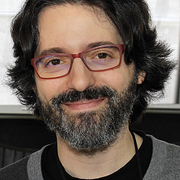Andrés Neuman
Author of Traveller of the Century
About the Author
Image credit: Author Andrés Neuman at the 2016 Texas Book Festival. By Larry D. Moore, CC BY-SA 4.0, https://commons.wikimedia.org/w/index.php?curid=53513025
Works by Andrés Neuman
Pequenas resistencias: antologia del nuevo cuento espanol / Small Resistance: Antologia del nuevo cuento espanol/… (2002) — Edición y selección — 13 copies
Associated Works
Granta 113: The Best of Young Spanish Language Novelists (2011) — Contributor — 157 copies, 3 reviews
And We Came Outside and Saw the Stars Again: Writers from Around the World on the COVID-19 Pandemic (2020) — Contributor — 12 copies, 1 review
Tagged
Common Knowledge
- Canonical name
- Neuman, Andrés
- Birthdate
- 1977
- Gender
- male
- Nationality
- Argentina
- Birthplace
- Buenos Aires, Argentina
- Places of residence
- Buenos Aires, Argentina (birth)
Granada, Spain - Education
- University of Granada
- Occupations
- poet
translator
columnist
novelist
Members
Reviews
Lists
Awards
You May Also Like
Associated Authors
Statistics
- Works
- 78
- Also by
- 3
- Members
- 1,139
- Popularity
- #22,542
- Rating
- 3.8
- Reviews
- 54
- ISBNs
- 149
- Languages
- 9






















In short, I am a little disappointed in what seemed like such a promising novel. It concerns a man called Hans who turns up in the city of Wandernburg, which appears to occupy an ambiguous political and geographical position. He makes friends with an organ grinder and a Spanish man of business and starts a flirtation with an intellectually stifled woman. This flirtation would at times seem interminable, if Sophie were not such an interesting and vibrant character. I was so pleased that she wasn’t reduced to an object of desire, but had her own thoughts and motivations. The relationships that Hans forms, romantic and otherwise, are in fact the most powerful and appealing element of the book. Their evolution is sometimes masked (or perhaps allegorised and it went over my head?) by all the poetic and philosophical debate. I enjoyed the thoughtful discussion of translation and its links with love, but groaned when once again Kant’s views on nationhood were brought up. I also objected to the sub-plot about the serial rapist, which was extremely creepy and seemed gratuitous. Perhaps it was meant to signify something important about Society; I did not think it justified itself.
All this whining serves to show I had high hopes for the novel and they were not met. Neuman is evidently a gifted writer, though, and I’ll keep an eye open for more of his work. I did keep reading for 578 pages despite my reservations, for the sake of paragraphs like this:
There is also a certain perverse satisfaction in reading a novel that dwells on the act of translation at such length in its English translation.… (more)